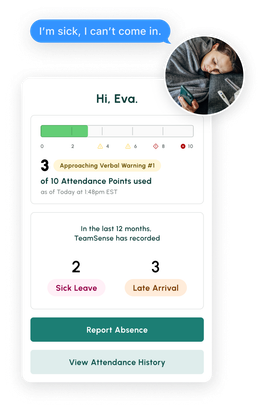Fix the root cause of No-Call No-Show with help from TeamSense
No business practice has escaped the effects of the pandemic, but it’s no secret human resources departments are in crisis.
Dramatic shifts in purpose and daily practices since 2020 have proved so dispiriting at least one major survey from Workvivo reports 98% of HR employees are ‘burned out.’1
Turnover is high and, compounding that, an empowered and picky workforce translates to a limited talent pool to alleviate the pressure.
“Everything’s changed [and] will continue to,” says Ryan Fleming, a Portland, Ore. human resources consultant. “In the shift to the […] digital workplace, the role of HR has changed enormously,” and drained professionals of emotional and physical energy outside their job descriptions. “Right now, everybody is just scrambling,” he says. “Human resources needs to reinvent the way it functions within the workplace.”
HR recruiters and experts say it is.

Human Resource Professionals Are Vital to the Company’s Success
Human resource departments have never been more critical to employers, and their recruiters are upping recruiting standards. HR applicants with professional certifications and specialties, once the province of young applicants compensating for resumes light on experience, are more valuable in 2022 to almost anyone looking to advance their human resources career. They can lead to higher pay and better promotions in a surging profession: “There’s no better time to enter the field,” Fleming says.
In the past, HR—which ascended from accounting departments a century ago—focused on administrative tasks such as paying employees and administering benefits, but today recruiters are looking for employees versed in virtual HR processes such as remote recruiting and automated onboarding or with an eye for data and compliance.
To be sure, the human resources industry is amid a paradigm shift—H.R is no longer the department just to help you with sick leave or W-2s but an evolving workforce more broadly influential over an entire organization’s direction and purpose. As new trends and unanticipated distractions continue to develop, industry professionals imagine traditional HR roles will be replaced—many already have been—by cloud-based software as well as technologies still unimagined.
Julie Reiken, CEO of Trackstar, a Colorado-based software company that helps HR with online performance reviews, imagines a new layer—“I don’t know what that would look like, though,” she says. HR professionals are freed up to move into more influential roles like teaching managers and employees new skills to manage everything from conflict to vacation time.
In short, she says, HR needs other employees to “pick up some slack.”
“HR has always been important, but it belongs in the C-suite with the CEO and CFO,” says Reiken, who also directs strategy at the Society for Human Resources Management’s Denver branch. In recent years major companies from General Motors to Dunkin' Brands Group to Etsy have promoted human resources professionals to powerful executive positions.
“If I am hiring for human resources, I’m not looking for the same employee anymore,” Reiken says, referring to old-fashioned HR skills. “I want someone who understands the entire organization’s goals, who understands the balance of engagement versus attrition, who can help me plan and think about the time it’s going to take me to hire, what are the pay grades, what are the career paths. I’m looking for a strategic partner in the workforce who sees my organization holistically.
“I want a partner there with me.”
The Battle for Talent
Employees like that, though, aren’t easy to find. HR professionals are tired.
The pandemic forced HR departments to reckon with business practices rooted in 20th-century factory culture. Managers, forced to disregard established practices and navigate new health and safety requirements, supported disoriented employees even as they were in a panic. Beyond that, HR was tasked with creating new relationships with IT departments to guide their companies and employees to a more digital, distributed work environment.
The transition took its toll.
A recent study conducted by Workvivo, an app designed to increase employee engagement, surveyed more than 520 HR professionals in the United States and the U.K. about burnout. Most HR professionals—98 percent of them—said they’re spent, and HR bosses say they’re, in turn, stretched perilously thin filling the gaps.2
“The pressure was huge when the pandemic started, and [even though pandemic restrictions generally lifted] it’s so much worse now,” says Katie Harman, a career HR professional newly retired after 30 years in public and private human resources departments in the Pacific Northwest.
“It’s a compounding effect. We weren’t hiring people in the pandemic. We were trying not to lose people and juggle really, really dramatic new needs. If you need to hire an engineer, and you don’t have anyone qualified to hire the engineer, you don’t have a product. If you have to hire people you’ve lost, that’s a lot of ground to make up.”
Professionals say established certifications such as the Society for Human Resource Management’s (SHRM-CP) are invaluable for applicants to add promise to their resume, but HR professionals can expect to see certifications in new skill sets that haven’t been created yet. They might involve newly important expertise with data, remote work, or inclusivity and engagement expertise. Says Alex Buder Shapiro, chief people officer at Flatiron Health: “We] … have to build the plane while we are flying it.”
Official data is scant and difficult to measure. Still, from Vanderbilt University in Tennessee to South Puget Sound Community College in Washington, anecdotal evidence from administrators points to intensifying interest in specific skill sets.
“I get so many calls from curious students,” said one Vanderbilt career counselor who could not be named because she was not authorized to speak to reporters, “but I only get so many who are actually interested. There’s a lot of enthusiasm, and students want to know what human resources will look like in the future. It’s not a matter of if we will get more interest in certifications but when, but I can’t really tell them what human resources will look like. Human resources is still figuring itself out.”

But What Does the Future Hold for HR Advancement?
But for all the anticipation, business loves certainty. It remains to be seen when, or if, hopeful human resources professionals will significantly embrace the expense and time of a new professional certification.
Experts and workers say experience developed without certifications still holds significant value with recruiters but suggest professionals gain it more intentionally than before. Some suggest aspiring human resources employees invite themselves to high-level meetings to listen in. “You're trying to get a more holistic sense of your employer,” says Reiken, who nearly evangelizes about HR careers because, she says, there aren't enough qualified HR professionals in the workforce to match the industry’s needs.
Many human resources positions still don't require certifications to apply. However, aspiring human resources professionals like 23-year-old Linda Lopez say they worry the field is too unstable to make an informed choice about a certification. Lopez, who’s planned on a career in human resources for as long as she can remember, recently earned a certificate to work as a lab assistant instead. Practical experience, to her, outweighs the time and expense of earning a certification. It’s groundwork and—considering how she’s seen other human resources professionals struggle during the pandemic—she says it’s insurance against potential burnout. “How,” she asks, “can I be a human resources manager without experience in my field?”
Lopez realizes companies need her more than she needs them, but despite tempting opportunities to specialize, she doesn’t yet trust entering a career in which she might still be studying duties that, for example, could be automated.
“I don’t want to participate in [human resources’] growing pains. [They] seem so desperate. Who knows what that means? I just want to get the right [professional certification] for me, not just something I feel like I have to get because HR is panicking. I’m going to let things settle so I can take my time to learn new skills.
“I have an advantage,” she says. “I don’t have to unlearn the old ones.”
Top 3 Certifications for HR Professionals
Traditional human resources degrees enhance salary and position. A bachelor's degree in leadership, business administration, or communications remains the go-tos for professionals. But if employees already have a degree, it’s more meaningful than ever to have a nationally recognized certificate.
Industry experts and recruiters say the top three are:
1. SHRM Certified Professional, or SHRM-CP. This certification issued by the Society of Human Resources Management is designed for HR professionals already in the field and looking toward management positions. The certification is for HR professionals engaged in operational roles such as implementing policies and serving in many day-to-day HR functions.
2. Senior Professional in Human Resources, or SHRM-SCP. This certification, also issued by SHRM, was built for HR professionals at a senior level. This one is ideal for those already in strategic roles looking to move into positions where they will develop HR policies, oversee the execution of HR operations, or lead HR strategy.
3. Senior Professional in Human Resources, or SPH. This certification, issued by the Human Resources Certification Institute, is designed to develop knowledge in the field.
“If I were 25 years old again, I would be doing one of these,” says Kimberly Anderson, a recruiter who hires in the public sector but never attempted a certification. “I had the experience, and that’s what counted. Now that human resources is changing so much, I would absolutely be getting a certification (such as SHRM-CP) because right now, that’s what counts.”
4 New Roles for HR Professionals to Explore
Many experts point to a necessary focus on technology and sciences because HR professionals will increasingly be asked to work alongside IT and understand the inner workings of evolving technologies. Melanie Schendel, 24, manages an ever-shifting mobile workforce of caregivers. She says, “Human resources as a field is changing so fast,” that she’s taking her time deciding her next career move: “Are there even certifications for jobs that don’t even exist yet?”
The Society of Human Resources Management predicts more technology-centric roles will emerge in coming years, and recruiters say they will increasingly consider additional technological training as premium skills.
According to SHRM, here are the top new roles to train for.3
1. AI Data Ethics Officer. A human bias officer would help ensure algorithms used in making workforce decisions are free of bias related to race, gender, sexual orientation, religion, and age.
2. Chief HR Technology Optimization Officer. Burgeoning technology platforms used in HR and the adoption of software-as-a-service (SAAS) technologies need a chief HR technology optimization officer with sharp communication skills to manage the chaos.
3. Experience Engineering Specialist. Michael Rochelle, chief strategy officer and principal human capital management analyst for the Brandon Hall Group, an HR advisory and research firm in Delray Beach, Fla., says, “There's a need for more people in HR who really understand software because systems in the function are becoming more sophisticated. The world is moving toward 100 percent web-based HR support, and HR needs to operate like a services organization in terms of treating employees like customers.”
4. Data Science Manager. Leaders need evidence to make decisions, and a data specialist would make sense of data from team member surveys, recruiting platforms, benefits portals, and other HR systems to solve problems.
Looking to recruit new HR professionals to your team? Try TeamSense’s Text to Apply recruiting software. Simplify your recruitment process by using text messaging to connect the right candidates to your open positions.

Is your call-in process terrible? Text reduces no-shows and absenteeism by up to 40%.
Don't believe us? Check out this case study to see how this 3PL benefited.
About the Author

Matthew Bourgois-Ebnet, TeamSense Author
Matthew Bourgois-Ebnet is a reporter with 30-years of experience as a writer and editor in print journalism specializing in trends and investigative features. He’s passionate about giving voice to the middle class and those who wouldn’t otherwise be heard. He writes about business trends for TeamSense.





